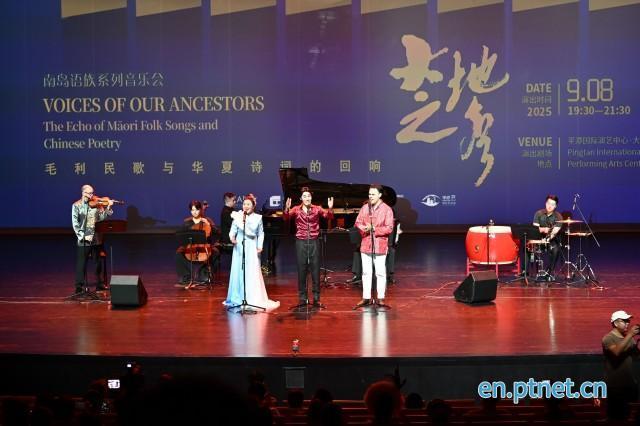Cross-cultural concert "Echoes of Earth" blends Maori folk songs and Chinese poetry in Pingtan
en.ptnet.cn | Updated:2025-09-12 | Lin Kongbo, Stephanie
Pingtan, located off the coast of China's Fujian Province and the mainland's closest point to the island of Taiwan, stands as the country's second international tourism island (after Hainan) and a vital hub for cross-Straits integration and cultural exchange. On the evening of September 8, 2025, this vibrant island hosted a landmark cultural event—the "Echoes of Earth: Resonances Between Maori Folk Songs and Chinese Classical Poetry" concert—at the Pingtan International Performing Arts Center, drawing applause for its seamless fusion of two distinct cultural traditions.
The concert was the culmination of eight months of preparation and featured 14 selected works that bridged New Zealand's Maori heritage and China's poetic legacy. It opened with the haunting melody of The Song of Chile, a classic Chinese folk piece rooted in ancient poetry, setting the tone for a night of cultural dialogue. The program then weaved between Chinese literary treasures—such as the lyrical Green Jade Table: Lantern Festival and the bold Bringing in the Wine—and Maori classics, including the soulful Song of the Wind and a traditional Maori love song. A highlight came with Girl, Oh Girl, a Maori piece that later sparked shared emotional resonance among the audience.
The concert's most striking aspect was its cross-linguistic performances, a testament to the artists' dedication. Maori artist Eru Oneroa spent six months practicing Mandarin to master the nuances of Chinese poetry, delivering a heartfelt rendition of lines from The Jade Zither—"Why should the jade zither have fifty strings? Each string, each fret, recalls a year gone by"—that earned enthusiastic cheers. In turn, Chinese vocalists impressed with their fluent Maori during the group performance of the traditional Maori love song, showcasing mutual respect for each other's cultures.
Andrew Bill, a renowned New Zealand violinist who performed at the event, emphasized the universal power of music to connect people. "Music is a common language for humanity," he said. "Great music from any corner of the world has the power to touch the heart, and when I played Chinese pieces tonight, I felt a deep emotional connection."
Zhou Nan, a Chinese baritone singer based in New Zealand, shared his personal commitment to cultural exchange. "Though I live overseas, my heart is always linked to my motherland," he noted. "Using the fusion of Maori folk songs and Chinese poetry to spread Chinese culture is the most beautiful mission for a musician like me. I will continue to work with my friends to tell China's stories to the world."
Audience member Chi Yueqing echoed the sentiment of cultural unity. "When Chinese and Maori artists sang Girl, Oh Girl together, I felt the warmth of family ties in Maori culture, and it made me think of the deep bonds of blood in Chinese culture too," she said. As the final number settled into silence, artists from both traditions stood hand-in-hand. No bow felt hurried; no applause rushed. The audience rose, not in excitement, but in gratitude—for a reminder that beauty needs no translation.
Following the Pingtan performance, the concert team will travel to central China's Hunan and Hubei provinces to bring the cross-cultural experience to more audiences.

 Fujian Public Security Registration Code: 35012802000271
Fujian Public Security Registration Code: 35012802000271